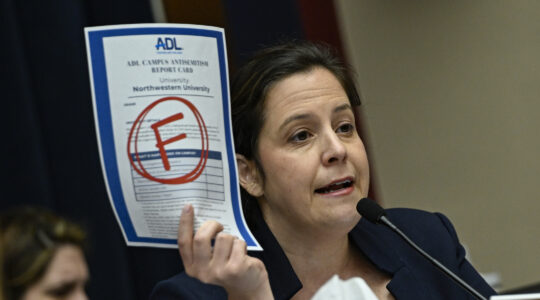
Obama surrogate Jack Lew making a point during his debate with Romney surrogate Tevi Troy at Green Road Synagogue in Beachwood, Ohio, with moderate Nathan Diament listening in the background, Nov. 1, 2012 (Ron Kampeas)

President Barack Obama and Republican candidate Mitt Romney. (Graphic by Uri Fintzy)
BEACHWOOD, Ohio (JTA) — The family wedding. The entrance to the local synagogue. The future of Israel. Your precious grandchild.
In the final days of what has been a close and bitterly contested election, it’s not so much that nothing is sacred in the fight for the Jewish vote. It’s that little that is sacred has not been put to use.
Efforts to pick up Jewish votes in states such as Ohio, Florida and Virginia have stressed themes of Jewish vulnerability and of threatened Jewish values. Jewish voters said at times they were taken aback by the tone.
Ruth Sudilovsky-Pecha said she gasped when she read an open letter in the latest edition of the Cleveland Jewish News in which Josh Mandel, the Republican vying to unseat Sen. Sherrod Brown (D-Ohio), was excoriated by some of his wife’s cousins.
In the letter, nine members of the Ratner family, a prominent Ohio clan that made its fortune in real estate, recalled their happiness when Mandel, the Ohio treasurer and a U.S. Marine Corps veteran, married into their family. But they noted their dismay over his opposition to same-sex marriage and allowing openly gay people to serve in the military. They cited a family member who married a same-sex spouse and also served in the military.
“This family is sprawling and diverse, but it has always believed strongly in the values of equality and inclusiveness,” said the letter, which appeared as a full-page ad in the paper. “Your discriminatory stance violates these core values of our family.”
“I was like, ‘whoa,’ ” Sudilovsky-Pecha, 48, a social worker who lives in Solon, a suburb of Cleveland, said after leafing through the paper, the last before the election. “I may agree with them, but you’ve got to wonder what Shabbos dinner and Pesach is like.”
The family feud permeated the pages of the Jewish weekly and reflected the intensity of the election debate. In more full-page ads, two other Ratners, real estate magnate Ron and Susan, endorsed Brown and President Obama, while on a later page, two more Ratners and a dozen Mandels joined several hundred Ohio Jews in endorsing Mandel.
Another ad taken out in the paper by the Defend Israel Movement, which gave its address as a post office box in Israel, likened Obama to Neville Chamberlain, the British prime minister who appeased Hitler.
Such rancor was largely absent from a Nov. 1 debate organized by the Orthodox Union at Green Road Synagogue, an Orthodox shul in this affluent Cleveland suburb of 12,000. But the caliber of the speakers reflected the importance attached to Ohio by the campaigns: Jack Lew, the White House chief of staff, acting in a personal capacity, argued for Obama, while Tevi Troy, a former deputy secretary of health and human services, made the case for Republican nominee Mitt Romney, whom he now advises.
The surrogates adamantly disagreed on a number of topics. Troy said that Obama sought to “create daylight” between the United States and Israel, while Lew said the president had defended Israel to a degree that few predecessors had and imposed tough sanctions on Iran.
Lew also faulted the Romney campaign for pledging to reduce the deficit without offering specifics.
Troy, who also served as White House Jewish liaison under President George W. Bush, countered that Obama pursued a “unipartisan” strategy in advancing his own fiscal reforms, preferring to ignore Republican advice and contributions. Lew, in the single instance he raised his voice, vehemently denied the point.
Troy and Lew, however, reserved much of their passion for their wrap-ups, when each spoke of the joys of being an Orthodox Jew serving in a senior government position.
“I enjoyed their personal experiences as Orthodox Jews, their commitment to their work,” said Rebecca Miller, a retiree who attended with her daughter. “It made me proud.”
Outside, as the audience members headed into the night, the intensity returned. A Democrat argued with a few Jewish Republicans who had gathered earlier near the entrance carrying an “Obama, Oy Vey” banner over whether Romney would roll back abortion rights.
Holly Litwin, a teacher at the Conservative movement-affiliated Gross Schechter Day School who attended the debate, said she was exhausted by weeks of robocalls, campaign mailings and postings throughout her suburban Cleveland neighborhood.
“I’m shocked by the personal attacks on the integrity of individuals,” said Litwin, of Shaker Heights, who recently moved to Ohio from Oregon, a solidly Democratic state that is not subject to such intensive campaigning.
Litwin was mailed a DVD, “Dreams From My Real Father,” which presents a conspiracy theory alleging that Obama has covered up his true origins as the illegitimate son of a black American communist.
“I had a visceral reaction,” she said. “I took it as if it was contaminated and deposited it in the recycling.”
Stanley Stone, a textile business retiree, said he also has been subject to a stream of fliers and phone calls from Republicans and Democrats in recent months.
Saying that Obama “inherited a lot of problems,” Stone said he wasn’t buying Republican claims that the president’s strategies had failed to revive the economy.
Fred Taub, a Cleveland Heights resident who writes and speaks against boycott and divestment efforts targeting Israel, said he was supporting Romney.
“Two reasons — the economy and Israel, he said. “I can’t afford Obama, and he’s snubbed Israel too many times.”
But Taub also said that his Republican Jewish friends were weary of the material targeting Jewish voters.
“I don’t look anymore, you get sick of hearing the complaints from both sides — and I think most people have decided,” he said.
Sudilovsky-Pecha said that Republican ads had raised questions in her mind about Obama.
“I’m not a hundred percent convinced Obama’s as strong a supporter of Israel as I would like him to be, but he’s not as weak a supporter as Republicans paint him,” said Sudilovksy-Pecha, who has family in Israel. “But as a social worker, I can’t imagine living in country led by Romney with his ‘47 percent.’ ”
She was referring to a secretly recorded fundraiser appearance in which Romney dismissed Obama’s voting base as the 47 percent of Americans who do not pay income tax and, he claimed, are dependent on the government. The Obama campaign has bombarded swing states with ads featuring the remarks, for which Romney has expressed regret.
A September survey of 238 Jewish registered voters in Ohio by the American Jewish Committee found 64 percent saying they would vote for Obama, 29 percent supporting Romney and 7 percent undecided.
Ohio isn’t the only battleground state where Jewish votes are being sought aggressively.
The Emergency Committee for Israel, a political action committee that has been criticizing the president and other Democrats on Israel since 2010, has been doing robocalls in Wisconsin, Ohio and Virginia.
The first round of ECI’s calls spliced together disparate statements by Obama and Israeli Prime Minister Benjamin Netanyahu — some of them made years apart — and presented them as a “debate” between the two leaders, thus suggesting that they disagree on the need to confront Iran’s nuclear program.
But the Obama statements were not about the nuclear issue, and the statement excerpted from Netanyahu was taken out of context from a speech in which he praised Obama’s commitment on the issue. The Washington Post’s Fact Checker columnist called the robocall “an Orwellian descent into falsehoods and misrepresentation.”
A second ECI robocall, also using spliced quotes to create a “debate,” focused on differences between Netanyahu and Obama over Israeli settlements and building in eastern Jerusalem.
Meanwhile, in the week before Election Day, Jewish Democrats and Republicans both made their final pushes.
In a National Jewish Democratic Council video, Barbra Streisand emphasized what she predicted would be a rollback of women’s rights under Romney. “Mitt Romney does not share our values, I know Barack Obama does,” she said.
The Jewish Council for Education and Research — the pro-Obama political action committee behind a series of popular and profanity-laced pro-Obama videos featuring celebrities such as Sarah Silverman and Samuel Jackson — released a G-rated musical video, “Call your Zayde,” urging young Jews to phone their grandparents in swing states and tell them to vote for the president.
The Obama campaign released a video of Ed Koch, the former New York City mayor, explaining his support for the president’s reelection. Koch and Harvard law professor Alan Dershowitz both wrote separate Op-Eds making the case for Obama’s reelection, defending his commitment to Israel and touting his positions on domestic policy issues. Footage of Koch and Dershowitz criticizing or questioning the president’s Middle East approach previously had been featured in anti-Obama videos.
The Republican Jewish Coalition released a video, which the group is running as a TV ad in Florida, featuring Bryna Franklin, a former chairwoman of Democrats Abroad-Israel, assailing the president’s record on Israel and the economy. With Jerusalem’s Old City in the background, Franklin urges American Jews to “switch sides and vote for Mitt Romney for president.”
JTA has documented Jewish history in real-time for over a century. Keep our journalism strong by joining us in supporting independent, award-winning reporting.





